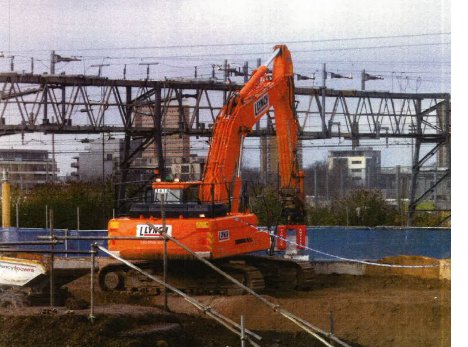£1million fine for company after man crushed by excavator
A construction company has been fined £1million and ordered to pay more than £100,000 costs after a worker was crushed to death by an excavator on a site the company was working.
Southwark Crown Court heard on 2 August how, in March 2014, during night work at a construction site in Stratford, London, site operative Kevin Campbell was struck by an excavator-mounted vibrator (EMV) attached to a 35-tonne excavator. It crushed him against a concrete wall.
Kevin Campbell had been disconnecting lifting accessories from a pile of metal that had just been extracted from the ground when he was hit. He died from his injuries. Another site operative next to him also faced the risk of being struck but escaped.
An investigation by the Health & Safety Executive found the construction company, Clancy Docwra Ltd, had failed to ensure the safety so far as is reasonably practicable of its employees and of others who were not their employees working on the site.
The investigation also found that Daniel Walsh, of Eastcote in Orpington, Kent, who was the site supervisor and was operating the excavator at the time, failed to take reasonable care for other persons on site. He was given a six-month suspended prison sentence and ordered to pay £15,000 costs.
Clancy Docwra Ltd of Coppermill Lane, Harefield, Middlesex, pleaded not guilty to breaching Section 2(1) and 3(1) of the Health & Safety at Work etc Act 1974 but was found guilty. The company was fined £1,000,000 and ordered to pay costs of £108,502.30.
Daniel Walsh also pleaded not guilty to breaching Section 7(a) of the Health & Safety at Work etc Act 1974 but was also found guilty. He was given a six month custodial sentence suspended for 12 months as well as being or der to pay costs of £15,000.
Speaking after the hearing, HSE inspector Darren Alldis said: “This death was wholly preventable and serves as a reminder as to why it is so important for companies and individuals to take their responsibilities to protect others seriously and to take the simple actions necessary to eliminate and minimise risks.
“If the risks had been properly considered by the company and simple and appropriate control measures were put in place, then the likelihood of such an incident occurring would have been significantly reduced. Informing all site operatives of the specific risks they face when carrying out such tasks and the control measures required of exclusion zones, the importance of communication and the mandatory use of excavator safety levers, were simple actions that should have been put in place and their effectiveness monitored.
“All those with legal responsibilities must be clear that HSE will not hesitate to take appropriate enforcement action including, where appropriate, prosecution against those that fall below the required standards."

